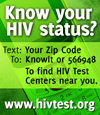American Indians/Alaska Natives and HIV/AIDS
There are more than 1 million people in the United States living with HIV. One-fourth of them do not know that they are HIV-infected. Could you be one of them? The only way to know if you have HIV is to get tested.
HIV is the virus that causes AIDS, and it is affecting thousands of American Indians and Alaska Natives (AI/AN). AI/AN have the third highest rate of AIDS diagnoses in the United States, despite having the smallest population.
AI/AN people with AIDS are likely to be younger than non-AI/AN people with AIDS.
AI/ANs also have the shortest time between AIDS diagnosis and death.
Sixty-one percent of AI/AN men living with HIV/AIDS in 2005 are men who have had sex with men. Another 15 percent were infected through injection drug use. Sixty-eight percent of AI/AN women living with HIV/AIDS in 2005 were infected through heterosexual contact, and 29 percent were infected through injection drug use.
Know Your Status. Get Tested for HIV.
If you do not know if you are infected with HIV, you could be spreading it to others. If you are HIV positive, you must take steps to prevent passing your HIV infection to another person.
If you find out that you have HIV, it does not mean that you are going to get sick and die. While there is no cure for HIV, new drugs are available that can help you stay healthy and decrease the amount of HIV virus in your body.
What Is the HIV Test?
The HIV test detects whether or not you have been exposed to the HIV virus. There are several different kinds of tests: blood tests, urine tests, and an oral (mouth) test. Only a very small amount of blood is needed for the blood tests.
HIV tests can take a few days to 2 weeks for results, or with rapid HIV tests you can get results in about 20 minutes.
Where Can I Get Tested?
Free and confidential or anonymous HIV tests are available. To find an HIV testing site near you, visit www.hivtest.org.
Or, call:
1-800-CDC-INFO (1-800-232-4636)
TTY: 1-888-232-6348
In English, en Español
Open 24 hours a day — Confidential
What Else Can I Do?
You have the power to help stop the spread of HIV.
- Be safe. The best way to prevent HIV is to abstain from having sex. If you do have sex, use a new latex condom every time. Do not share needles or syringes.
- Talk about it. Talk about sex and HIV with your partners. Find out when they were last tested for HIV and what their status was. Be clear that you will be having safer sex…or none at all.
- Talk to your doctor. If you are sexually active, you should get tested for HIV at least once. Do not assume your doctor will ask you to be tested for HIV.
- Spread the word. Thousands of AI/AN are getting HIV each year. Set an example by getting tested and spreading the word that others should do the same.
For more information about HIV and AIDS, visit: www.AIDS.gov.
National HIV Testing Mobilization Campaign
U.S. Department of Health and Human Services
08/07



